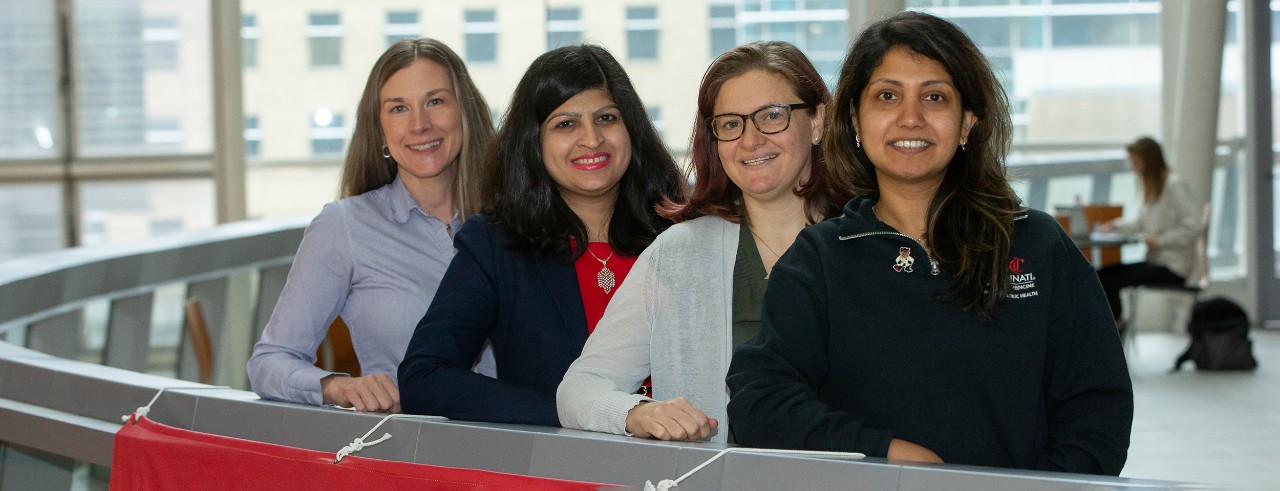
UC study explores barriers to contraceptive use in females with kidney disease
Research cites insufficient counseling, lack of educational resources as factors
The percentage of females with kidney disease who use contraception is much lower than the rate of contraceptive use by females in the general population, according to a new study from researchers at the University of Cincinnati.
The study was published in the journal Kidney Medicine.
“Although kidney disease adversely impacts fertility, conception is common among women with chronic kidney disease, kidney failure on dialysis and kidney transplant. History of kidney disease increases the risk of adverse pregnancy outcomes, including preeclampsia, fetal growth restriction and preterm babies,” says Silvi Shah, MD, associate professor in the Division of Nephrology at UC and lead author of the study.
“Unplanned pregnancies occur in women with kidney disease. It is of paramount importance that pregnancies in this high-risk population are planned and gives us the opportunity to counsel women about family planning and the impact of pregnancy on kidney disease, and the impact of kidney disease on maternal and fetal outcomes.”
The study found five to 10% of females use contraception, compared to 60% in the general population. Inadequate counseling, insufficient educational resources, lack of multidisciplinary coordination and variable knowledge are the barriers reported by patients for low contraceptive use with kidney disease.
In the study, the investigators conducted focus group interviews in adult female patients with chronic kidney disease, kidney transplant and kidney failure requiring dialysis. The following five themes were identified with the qualitative analysis:
1) varying knowledge regarding reproductive health with kidney disease
2) inadequate counseling about contraceptive use
3) lack of interdisciplinary coordination regarding contraceptive use
4) insufficient educational resources available to guide the contraceptive discussion
5) need for research to better understand reproductive needs in females with kidney disease
“Qualitative studies such as this one show us the importance of listening to our patients and communicating better with them and the larger care team. Simply telling a patient the risks is not enough anymore,” says co-author Meredith Pensak, MD, associate professor in the Department of Obstetrics and Gynecology at the UC College of Medicine.
Shah says the study is unique in that it addresses perspectives and barriers facing females with kidney disease with regards to contraceptive use in the United States. The study highlights the importance of increasing awareness and improving multidisciplinary care for reproductive health for patients with kidney disease.
Assisting Shah and Pensak in the research were Priyanka Gudsoorkar, Department of Environmental Health, UC College of Medicine; Prema Vyas, Texas Christian University; Sunshine Barhorst, UC Section of Transplant Nephrology; Prasoon Verma, Division of Neonatology, Cincinnati Children’s; and Goni Katz-Greenberg, Duke University. Shah is supported by a K23 career development award from the National Institutes of Health.
Lead photo of Barhorst, Shah, Pensak and Gudsoorkar/Andrew Higley/UC Marketing + Brand
Next Lives Here
The University of Cincinnati is classified as a Research 1 institution by the Carnegie Commission and is ranked in the National Science Foundation's Top-35 public research universities. UC's graduate students and faculty investigate problems and innovate solutions with real-world impact. Next Lives Here.
Related Stories
UC study: Brain organ plays key role in adult neurogenesis
July 2, 2024
The University of Cincinnati has published research in the Proceedings of the National Academy of Sciences that found the choroid plexus and cerebrospinal fluid play a key role in maintaining a pool of newly born neurons to repair the adult brain after injury.
Put down that beer; it's not a tanning lotion
July 1, 2024
The University of Cincinnati's Kelly Dobos joined WVXU's Cincinnati Edition to discuss what's fact and what's myth when it comes to sunscreen use, different kinds of sunscreen and a social media recommendation to use beer on your skin to help get a tan.
Cincinnati researchers want to know if MRIs can work better
June 28, 2024
WVXU and the Cincinnati Business Courier highlighted a new collaboration between the University of Cincinnati College of Medicine, UC Health GE HealthCare, JobsOhio, REDI Cincinnati and Cincinnati Children’s to create an MRI Research and Development Center of Excellence located on UC’s medical campus.
UC opens Blood Cancer Healing Center
June 28, 2024
Media outlets including WLWT, Local 12, Spectrum News, the Cincinnati Enquirer and Cleveland.com highlighted the opening of the University of Cincinnati Cancer Center's Blood Cancer Healing Center.
New project aims to better support teen mothers in Adams County
June 27, 2024
WCPO highlighted a partnership between the University of Cincinnati and the Adams County Health Department that is aiming to provide better support for teen mothers in the county.
Free Wi-Fi, work area coming to Greater Cincinnati
June 27, 2024
St. Lawrence Park in Price Hill now has free Wi-Fi and a furnished outdoor space for community members to access digital needs. The space is part of The Nodes Project, which stands for “Neighborhoods of Design Engagement": a collaboration between UC DAAP communication designers and community entities.
Study aimed at reducing opioid overdose deaths presents results
June 27, 2024
The University of Cincinnati's John Winhusen and Caroline Freiermuth discussed the evidence-based practices implemented during the HEALing Communities Study to fight the opioid epidemic with Spectrum News.
University of Cincinnati, UC Health collaborate with GE HealthCare on MRI research center
June 26, 2024
The University of Cincinnati and UC Health are collaborating with GE HealthCare, JobsOhio, REDI Cincinnati and Cincinnati Children’s to create an MRI Research and Development Center of Excellence located on UC’s medical campus.
The health impact of living near a natural gas leak
June 25, 2024
UC College of Arts and Sciences Professor Amy Townsend-Small talks to the BBC about the health issues faced by neighbors of leaking natural gas wells.
Male birth control gel inches towards FDA approval
June 25, 2024
The University of Cincinnati's Wesley Baas spoke with Yahoo News and the Cincinnati Enquirer about a new male birth control gel that could be close to receiving FDA approval.
